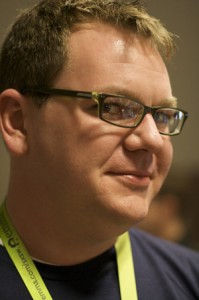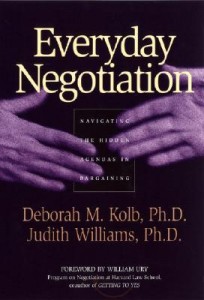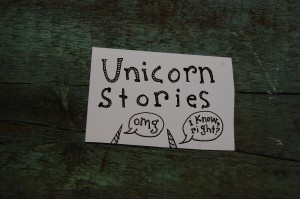
[caption id="attachment_979" align="alignright" width="199" caption="7th Son: Descent - Special Edition DOWNLOAD"]
Past editions of Voice Mail, Beth Dunn's newsletter on writing and voice.

[caption id="attachment_979" align="alignright" width="199" caption="7th Son: Descent - Special Edition DOWNLOAD"]

I got to spend some time today with Paige Arnof-Fenn, CEO and founder of Mavens & Moguls, a global strategic marketing consulting firm based here in the Boston area. She gave me an awful lot to chew on, but the part that I want to share with you now is what she had to say about how things are changing -- have already changed, in fact -- in the way business gets done today.
One of the things she talked about was how flat organizations like hers, which largely offer project-based work that draws on a diverse network of highly qualified, niche contract workers, can offer flexibility and responsiveness that the more traditional structures can't.
It's a lot like what I talked about back in January, about how the smartest traditional companies are exploring how opt-in, project-based work can help cut costs and offer valued employees flexibility and autonomy, while keeping them in your company's quiver, as it were. (This was based on an excellent post from the always thoughtful Rachel Happe of The Community Roundtable. Still very much worth a read.)
While (some) consultants have worked like this for a long time, the model is starting to emerge in the HR practices and policies of larger, forward-thinking companies. More and more, people are looking for a different model of work, one that includes (1) greater variety in both projects and team composition, (2) more flexibility to work more or less as circumstances change, and (3) more opportunity for virtual work and asynchronous collaboration. Of course, ideally we all want at least a little security, and to belong to some sort of loose cadre of colleagues with whom we can build trust and rapport over multiple projects and time.
This model offers significant advantages to the organization as well. More virtual work means less overhead. More contract workers means more efficient compensation structures. All this adds up to increased agility and responsiveness for the organization that can successfully pull it off.
I believe that this trend was already taking hold in some corners before the economic meltdown of last fall, but that crisis has forced people to truly rethink how business gets done. As Arnof-Fenn pointed out, if you're waiting for business to "return to normal" after what happened last fall, you're going to be left behind. The train just doesn't stop at that station any more.
So my question to you is, what new patterns are you seeing? And what are you doing to stay alert to the new pathways that are emerging in this incredibly fluid time in business and technology? Are you looking for the old patterns, or are you training your eyes to see the newer, less familiar ones?
What do you see?
(If you haven't seen the image above before, try looking at it close up. Then get up and walk about 8-10 feet away and look at it again. What do you see?)

I've been working out for two hours every morning with a friend these last few weeks. It feels great.
It also takes a whole two hours every day. So why do I do it? I'm a busy woman!
OK, you probably know why I work out.
But it's made me think about the time commitment that scares off a lot of people from getting their businesses going online.
It's a lot like starting a new exercise program. How you justify it has a lot to do with how much you plan to get out of it.
If you do something every day, it gets a whole lot easier to do that thing. When I first got back on the treadmill a few weeks ago, it was harder than I wanted it to be. I was (am) pretty out of shape. Let's be honest.
But I never for a second thought that it would always feel that way, not if I stuck to the plan and dutifully showed up at the gym every day and did my thing. It gets better! Right? You know that.
Same thing with blogging -- actually, with writing in general -- and with anything else you do online. Practice -- regular, consistent, diligent practice -- makes you better at that thing. It gets much, much easier, lots more fun, and a whole lot more effective.
What do you think about when you're on the treadmill, on your bike, on the jogging path? Sure, I spend some of my time thinking about stuff I have to do that day, and about how I'm feeling at that moment (sweaty, sore, strong, powerful, superhero-esque, etc.), but for the most part, I try to think about how great the results are going to be. I think about short-term and long-term results.
Short-term results include how much better I'll feel that day -- sharper wits and faster reflexes and all that -- while long-term results are more about the ever-so-slightly-show-offy clothes I'll be able to wear in six months, the public speaking events at which I'll feel less self-conscious about my suit size, etc.
Can you think about the short-term and long-term results that you are driving towards with your online efforts? If you don't know what your short- and long-term goals are for all this, STOP RIGHT NOW and figure them out.
The other side of the ROI equation is, of course, the investment. And while I'm thinking about my expected returns on my exercise investment, I am also trying to learn to enjoy the investment itself. When I'm really deep into a long-term exercise and fitness regimen, like months deep into it, I love it purely for the experience. The sensation of feeling my muscles work in fluid symmetry, my lungs filling deeply with oxygen and powering my limbs with energy, my skin efficiently cooling me down with a salty sheen of sweat...
I dig all of that. And I don't have to think about the reward all the time, because the experience is the reward.
But you don't get there without the practice. Without the diligence. Without the repetition.
Like with everything else in life, more than half the battle is simply suiting up and showing up, every day, without fail.
It pays you back a hundredfold. Now. And later.

Olivier Blanchard (@thebrandbuilder on Twitter) recently wrote a very well-reasoned and delightfully detailed post on how companies can and should manage their various Twitter accounts.

What is it that you can do that others can't? What do you think is like falling off a log, it's so damn easy?
Why aren't you selling that?
No, really. Why not?
It seems like the simplest advice in the world:
But you'd be surprised at how often you (yes, you) ignore this basic truth.
Here are some of the things you like to tell yourself instead:
It's this last one that I think lies at the heart of most creative people's problems with making a living by doing what they do best: you think that "work" should be "hard."
We have a hard time wrapping our heads around the idea that work -- work that you get paid for and everything! -- can be fun, can come naturally, can be truly enjoyable, day in and day out.
Or we get caught up in "filling in the gaps" -- working like mad to balance our "soft" skills with "hard" ones.
(How come we always think the things we can do are "soft," but the things that we can't are "hard?" Let's stop doing that.)
Sure, you're a good painter, but you should really get better at accounting, so you can do your own bookkeeping.
Sure, you're a great writer, but you should really learn how to code websites, so that you have a "marketable skill."
Nonsense.
Do what comes easy. Do what you love. Find the people who need that thing. Sell it to them.
It's really, truly OK to make a living doing what comes naturally. I promise.

I'm reading a book right now called Everyday Negotiation: Navigating the Hidden Agendas in Bargaining, by Deborah Kolb and Judith Williams.

This week people of all ages are returning to school, which means that lots of folks are thinking harder than usual about what they want to be when they grow up, and how they might reasonably try to get there.
I thought it would be a good time to talk to someone who seems to me to be doing it right, in terms of making a living as a creative person, on her own terms and in her own way. People like this inspire me, and I think it's good to keep their stories in mind as we forge our own creative paths.
What follows are excerpts from an interview I did recently via email of the author of my very favorite webcomic, Hark! A Vagrant!
Kate Beaton lives in Halifax, Nova Scotia, and she writes one of the funniest and, yes, most erudite webcomics out there, Hark! A Vagrant!
She is clearly fascinated by history, especially of the Canadian, American, and European variety, and her comics present a quirky, often hilarious take on the many topics in this rich vein of content.
Her interests include the American Revolution (click on the images to enlarge*):
Naploeon's fateful campaign on Russia:
Robespierre and the French Revolution:
And, of course, Jane Austen:
Kate earned her undergraduate degree in History and Anthropology at Mount Allison University in New Brunswick, Canada. She began drawing comics for the university newspaper during her 3rd and 4th years at school, but then stopped after graduation. She picked it up again after about two years, when she started what would eventually become Hark! A Vagrant!
After showing her growing catalog of new comics to her closest friends, she was eventually persuaded to start posting them online. Now she lives in Halifax, where she earns her living primarily from her webcomic, its related merchandise, and other artistic projects.
I asked her how the process of posting her art online and making it public had changed the style and content of what she did:
Well, the style has changed because I've been drawing consistently since I began the comic. It's improving, I'm happy with that. As for content, I used to do more personal things, journal comics and inside jokes because it was just myself and my friends reading the comics. That mostly went away with a bigger audience, no one wants to read a comic about pointless inside jokes.
One of the striking things about the world of webcomics is the tightly-knit support network they have formed. There is a tremendous amount of cross-promotion and publicity that goes on among the emerging crop of webcomics artists, and they seemed to embrace Kate's endeavors right away:
When I started, I got a lot of encouragement, and that was a big boost. Online comics artists are often friends in the same way that any peer group would be, they do the same things, have similar interests and experiences, and are usually fans of other creators too. There were a lot of people helping me who I became friends with - Emily Horne, Joey Comeau, John Campbell, Ryan North, Richard Stevens, Meredith Gran, John Allison, Jeff Rowland - a lot.
What do you do during a typical day, now that you are back living in Halifax and making your living from your art?
I've yet to settle in to a typical day here in Halifax, it's been such a busy summer and I've hardly even been around. But days vary widely, sometimes it's all reading one day, sometimes it's making comics and failing, sometimes it's making comics and getting it right, sometimes it's making comics for other things, sometimes it's answering mail. Sometimes it's all of those things!
I noticed that on some of your earlier strips, you wrote in a line at the bottom that says something along the lines of "this is so dumb." I think it's a common thing for creative people to do, metaphorically or otherwise, to hang self-deprecating disclaimers on their work. This practice, as you know, has a number of drawbacks. What advice would you give to other creative people who do this?
Don't do that. I've done it once or twice under something that is especially ridiculous, but I still put it up, it's funny because it's so bad, people enjoy it. But you see a lot of people putting stuff up and saying about it "this is my shitty comic" or making excuses like "oh I only did this in 10 minutes so that's why it's so bad." They're scared people will make fun of what they are doing, but you have to put it out there, you have to let people judge for themselves. If it's bad, it'll get better in time, that's the way it always is.
Where did you get such a sinister view of mermaids?
Mermaids were always sinister, they drowned sailors!
Who do you think really killed the princes in the tower?
Henry Tudor, baby
The lessons I take from my interview with Kate are the usual reminders of how to live a creative, satisfying life:
In short, share your actual, authentic self with the world, and don't worry about the traditional or approved way of going about things. Find other people who share your take on things, and support them. Follow it where it goes.
What do you think? Who inspires you?
*All images reproduced with permission from the author. All images are copyright of Kate Beaton.

As I've mentioned before, I've been fiddling around with a number of fun side projects this summer. One of them has been a series of animated shorts called Unicorn Stories.

Okay, so you've decided to start blogging, or to get serious about the blog you have. Congratulations!
So you sit down at your desk, rest your fingertips softly on top of your keyboard and...
Nothing.
What on earth should you write about?
It's an old question. I have three answers. Three ways to overcome writer's block. Pick the one that you like best, or collect the whole set.
Decide ahead of time what you are going to write about on each designated writing day for, say, the next month. Open up a new Excel document, or create a new Google calendar just for this purpose, and for each day that you plan to write, assign yourself a topic. Align your topics with upcoming events, with the changing of the seasons, with the day of the week.
If you sit down to write one day and you have a better idea for a post, no problem! Just toss your discarded assignment into a Word document or some other notepad or sidebar, and refer back to this file when it's time to write your next month's schedule.
In this method, you don't worry about assigning topics to each writing day, but you do spend some serious time brainstorming topics. Make a huge list of things you might want to write about, and open this file every time you sit down to write. Be sure to cross things off when you've written about them, so that you don't inadvertently repeat yourself.
Remember that you are writing for your audience (whether you have an audience yet is beside the point), so try to build your topic bank with them in mind. What do they need? What do they want? How can you help them? What do they come to you for?
If you're a small business owner, try writing down topics that reflect every conceivable part of your business that a customer might be interested in. Look at the different pages of your website if you need help thinking in categories. Do you own a small inn or B&B? You probably have a page on your website titled something like "rooms" or "accomodations."
You might write about:
Now do the same thing with each page on your website.
Break each topic down into small, bite-sized pieces. Just write one bite per day, and put the rest back in the bank for another time.
This is really the secret weapon, if you ask me. Once you realize all the different ways in which you can create a blog post, you can free yourself from writer's block forever. I'm not kidding.
Blog posts don't always have to be long-form essays. Oh no. They can be:
And the list goes on. I find that the style bank helps me the most by far. Sometimes, you just don't have an essay-form post in you. And frankly, sometimes your audience can't stomach another wordy post, either. Grab a striking photo from your file of pictures or your Flickr photostream, post it, and write a line or two about it. Record a short video using your webcam and Youtube or Viddler or Seesmic. Record an audio clip using Utterli.
If you really want to make it easy on yourself, you'll create both types of banks: a Topic Bank and a Style Bank. Each day when you sit down to write, choose one item from each list. Mix and match to keep yourself and your audience from getting bored.
Just remember: you're not blogging for the sake of blogging. You committed to do this because you decided that it would help you achieve a certain goal, and you are trying, with every post, to serve your audience and to give them something that they value. Keep that in mind, and go forth and blog.